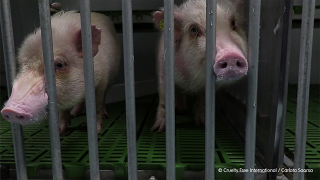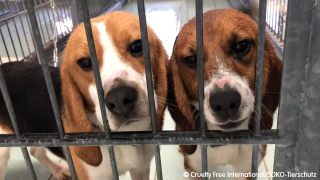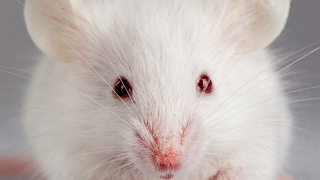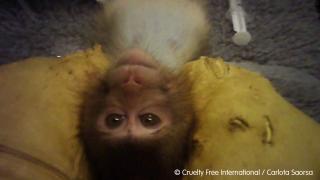Our new report reveals unnecessary and unjustifiable suffering
A review of experiments carried out on monkeys in UK laboratories has found that monkeys are still being subjected to extremely distressing, invasive and harmful experiments.
This is despite the ‘special protection’ allegedly given to them under EU and UK legislation.
The review was carried out by scientists from Cruelty Free International based on experiments that have been recently published in scientific journals. It found that monkeys are being used despite clear alternatives that would be more useful for helping human beings.
And it calls into question the need to use monkeys at all.
Although, there is a ban on the use of Great Apes in experiments in the UK, there is no such ban in place for monkeys. Yet monkeys are very similar to Great Apes – they are highly intelligent and have a similar capacity to suffer.
The UK is the third largest user of monkeys in experiments in the EU, using over 2,000 of them each year (including macaques and marmosets).
Such research continues largely in secrecy in universities, hospitals, contract testing facilities and even government laboratories across the UK.
This is despite a 2014 UK government poll of public attitudes to animal research which showed that the use of monkeys in experiments does not have public support. The poll found that only 16% of UK respondents said it was acceptable to use large monkeys such as macaques for medical research to benefit people. Only 19% supported the use of small monkeys such as marmosets. (1)
The majority of monkeys used in experiments in the UK are subjected to drug testing. These are standardised tests that are designed to assess the long term toxicity of new drugs. These studies are generally not published and are not often available for public scrutiny.
However, recent data from 13 large pharmaceutical companies for drug approvals made between 2007 and 2011, found that 95 per cent of drugs fail in human trials because they are not safe or do not work, even though they will have ‘passed’ tests involving monkeys.
Drug testing usually involves forcibly restraining the animals so that a test substance can be given by injection, a stomach tube or by forcing the animals to breathe it in. The monkeys may experience adverse effects such as vomiting, internal bleeding, respiratory distress, fever, weight loss, lethargy, skin problems, organ failure and even death.
Monkeys are also used in fundamental and applied medical research including HIV/AIDS, Parkinson’s disease, defence research, neurological disorder research and brain and behaviour experiments. This research inflicts some of the most severe suffering on the animals. They may have parts of their brain and nervous system surgically destroyed in order to artificially ‘create’ paralysis and depression.
Dr Katy Taylor, Director of Science at Cruelty Free International stated: ”Our Report shows that it is still far too easy for these highly intelligent and social animals to be used in extremely cruel and distressing experiments that are wasteful and even frivolous in their design.”
“Far from helping produce cures for debilitating human diseases, most of the experiments appear to have minimal benefits for humans and give the impression of having more to do with defending the continued use of monkeys or satisfying the curiosity of researchers than advancing medical science. In fact, we believe that the information actually needed to help human patients can be derived from alternative methods that do not involve monkeys or other animals, such as ethical studies in human volunteers and innovative experiments involving human tissues and cells.”
REFERENCES:
- Attitudes to animal research in 2014 – A report by Ipsos MORI for the Department for Business, Innovation & Skills: http://www.ipsos-mori.com/researchpublications/publications/1695/Attitudes-to-animal-research-in-2014.aspx












